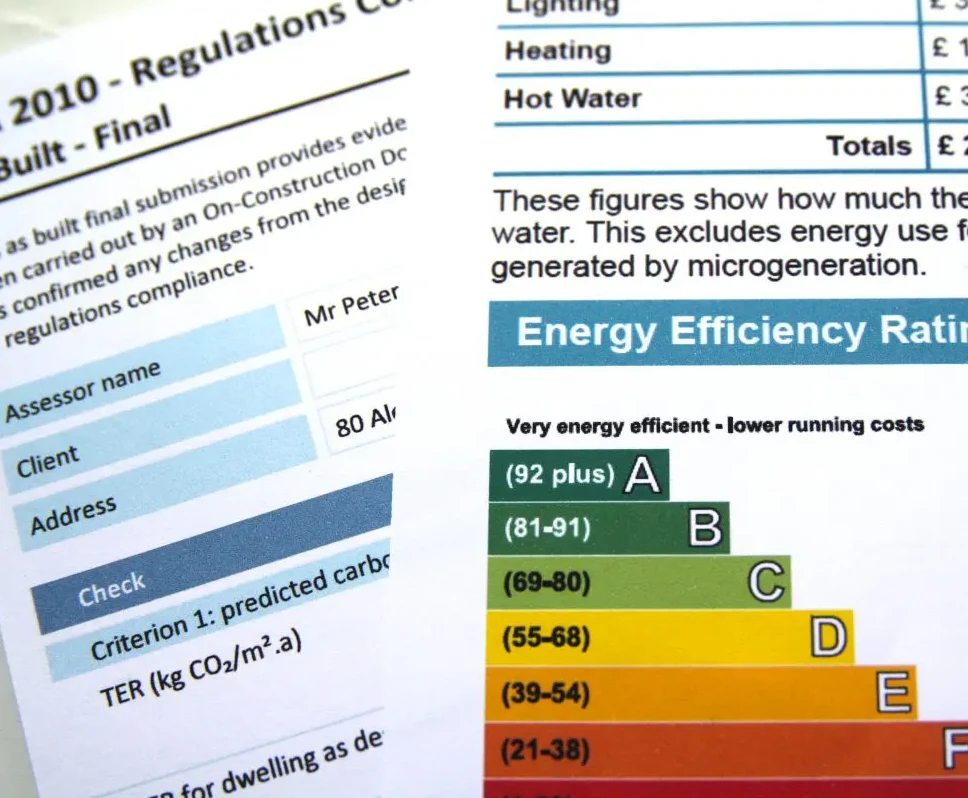Display Energy Certificates (DECS)
Ensuring Energy Efficiency in Public Buildings The purpose of introducing DECs is to raise public awareness of energy use and to inform visitors to public buildings about the energy use of a building.
How to Get a Display Energy Certificate
How to Get a Display Energy Certificate
-
To obtain a Display Energy Certificate (DEC), you must engage a qualified DEC assessor.
These professionals conduct a thorough assessment of your property and submit the report to the Central Register, providing you with a copy for your records.
-
How much is a display energy certificate?
The cost of a Display Energy Certificate (DEC) with Essential Green Skills starts from £180. Pricing can vary depending on the size and usage of the building, with larger and more complex buildings requiring more thorough assessments. Contact us for a detailed quote tailored to your property’s specifications.
-
How long does a display energy certificate last?
A Display Energy Certificate (DEC) is valid for 12 months for buildings over 1,000 square meters. For smaller buildings, between 250 and 1,000 square meters, a DEC is valid for 10 years. In all cases, an Advisory Report, which provides energy efficiency recommendations, must be updated every seven years.
Essential Green Skills
At Essential Green Skills, our members are extensively trained, qualified, and vetted to ensure they are ‘fit and proper’ individuals. You can trust us to deliver excellent service, along with an accurate and reliable energy assessment and certificate.
Get in touchUnderstanding the rules
According to the law, any building over 250m² occupied by public authorities and frequently visited by the public must display a Display Energy Certificate (DEC).
Adhering to these regulations is crucial for maintaining transparency and promoting energy efficiency in public buildings.
-
Key Requirements:
Display Energy Certificate (DEC): This certificate must be displayed at all times in a prominent place where it is clearly visible to the public.
Advisory Report: Buildings must also possess or have control of a valid advisory report.
-
Penalties for Non-Compliance:
Failure to Display DEC: A local authority can issue a penalty charge notice of £500.
Lack of Valid Advisory Report: A penalty charge of £1,000 can be issued for not having a valid advisory report.
What is a DEC? (Display Energy Certificate)
A DEC indicates the energy performance of a building by reflecting its energy consumption over the past 12 months. The energy efficiency rating is displayed on a scale from A to G, where A represents the highest level of efficiency and 'G' the lowest.
Buildings That Need a Display Energy Certificate (DEC)
Public authorities must have a DEC for a building if all the following conditions are met:
-
The building is at least partially occupied by a public authority.
(e.g., council, leisure centre, college, NHS trust).
-
The building has a total floor area of over 250 square metres.
-
The building is frequently visited by the public.

How long do DECs last?
-
Buildings with a total useful floor area over 1,000 square metres:
DECs are valid for 1 year.
-
Buildings with a total useful floor area between 250 and 1,000 square metres:
DECs are valid for 10 years.
How is a Display Energy Certificate (DEC) Completed?
-
On-Site Assessment
To complete a DEC, a qualified assessor will visit the site to conduct a visual inspection and gather the necessary data. This data collection will include 12 months' worth of energy bills from the occupier, which may encompass:
- Gas fuels
- Oil fuels
- Solid fuels
- District heating and cooling
- Grid electricity
- Electricity generated on-site or obtained through private distribution systems from other sites
-
Initial and Subsequent Assessments
Initial Assessment: The energy assessor must visit the site to produce the first DEC and advisory report.
Subsequent Assessments: For subsequent DECs and advisory reports, the assessor can base their evaluation on previous knowledge of the building, provided that:
- The same assessor produces the reports.
- The building occupant provides a declaration that no significant changes have occurred.
-
Certification and Registration
The DEC and advisory report must be lodged on the national register and assigned a unique certificate reference number. The national register is operated by Landmark, ensuring that each certificate is recorded and accessible.
By following this process, DECs ensure accurate and reliable assessments of a building's energy performance, promoting energy efficiency and compliance with legal requirements.
Frequently Asked Questions
-
What is a Display Energy Certificate?
A Display Energy Certificate (DEC) shows the energy performance of a building based on its actual energy consumption over the past 12 months. The energy efficiency is rated on a scale from 'A' (most efficient) to 'G' (least efficient). DECs are intended to raise public awareness of energy use and to encourage energy efficiency improvements.
-
Are Display Energy Certificates a Legal Requirement?
Yes, Display Energy Certificates are a legal requirement for public buildings with a total floor area over 250 square meters that are frequently visited by the public and occupied by public authorities.
-
What is the Difference Between EPC and Display Energy Certificates?
An Energy Performance Certificate (EPC) provides an assessment of a building's energy efficiency based on the building's construction and design, typically used when buildings are sold or rented. A Display Energy Certificate (DEC), on the other hand, measures the actual energy consumption of a building over the past 12 months, and is required for certain public buildings.
-
Do Schools Need a Display Energy Certificate?
Yes, schools that have a total floor area over 250 square meters and are frequently visited by the public must have a Display Energy Certificate.
-
Does a GP Practice Need a Display Energy Certificate?
Yes, GP practices that meet the criteria of being public buildings with a total floor area over 250 square meters and frequently visited by the public are required to have a Display Energy Certificate.
-
How Often to Get Display Energy Certificates?
- Buildings with a total useful floor area over 1,000 square meters need to renew their DECs annually.
- Buildings with a total useful floor area between 250 and 1,000 square meters need to renew their DECs every 10 years.
-
Is a Display Energy Certificate Renewed Annually?
Yes, for buildings with a total useful floor area over 1,000 square meters, the DEC must be renewed annually.
-
When is a Display Energy Certificate Required?
A Display Energy Certificate is required for public buildings with a total floor area over 250 square meters that are occupied by public authorities and frequently visited by the public.
-
Where to Display Energy Certificates?
Display Energy Certificates must be displayed in a prominent place within the building where they are clearly visible to the public.
-
Who is Responsible for the Display Energy Certificate for Schools?
The responsibility for obtaining and displaying a DEC in schools typically falls on the school's administration or facilities management team.
-
Who is the Regulator for Display Energy Certificates?
The regulator for Display Energy Certificates is the Department for Levelling Up, Housing and Communities (DLUHC) in the UK, and the national register is operated by Landmark.

